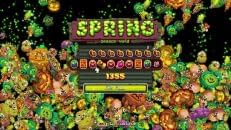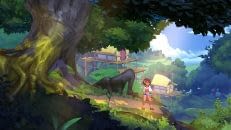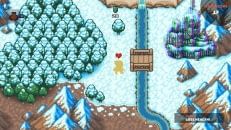“Building Awareness Is A Huge Step”: Indie Game Marketing Advice From Phil Hassey
As part of our lengthy interview with Phil Hassey for Issue 22 of our magazine we spoke to him about his latest release, Dynamite Jack, as well as his role in the rise of Ludum Dare. The interview came to a close with a focus on how to market an indie game and get noticed in the current climate, which is becoming increasingly cramped with more and more people turning to indie game development.
On the subject of the growth of indie game development in the last few years, Phil looks towards his own personal story to illustrate how accessibility of indie games as well as game development has spurred such an explosion of interest.
“The iPhone has really helped with the growth of indie games a lot. I started selling Galcon commercially in 2006 and back then I was still doing my day job, which was working for a web development company. It was in 2008 that I launched Galcon on the iPhone just as a hobby project and from there I sold enough to be able to work on it full time. It’s not just me either, there are so many iPhone developers who have the same story – they were working on a game in their off hours, launched it on the iPhone and from there were able to go full time.”
With all of these new indie developers fighting for the attention of players, it seems that Phil manages to stand out not only with his games but also his online presence. His website is full of pictures of him in various costumes and always with a lot of in-your-face attitude. One quote even reads “What kind of arrogant jerk has a website like this?”, as if to give the impression of eccentricity and the flaunting of one’s own personality. Yet, as we spoke to Phil it was apparent that he was one of the most laidback and down to earth developers we’ve spoken to – quite the opposite of what his online persona suggests.
This teased the question of how fabricated this presentation was and to what purpose? Is Phil attempting to stand out amongst a big crowd of attention-seeking indie game developers or is that just something for himself that happens to double up as such a thing?
“I guess for me I’ve always loved dressing up and costumes – my icon is me dressed up as Rambo with the Photoshop explosion in the background. I dunno, I just have a fun time doing that kind of thing. I love going to conferences and doing that kind of thing there too.
As far as how important it is, there’s no doubt that whether it be via your games, your personality or marketing; you definitely have to stand out. The App Store brings that need for an edge, I mean, how many games are on the App Store? Like 350,000 at least and there’s like 50-100 games being added every single day. Unless you’re being active in making sure your game stands out somehow, you’re not going to be remembered. Part of it could be making the development process interesting for people or maybe just being a big personality. You know, as a developer if you can make yourself memorable that’s really important too. Anything that makes people remember you and building awareness of what you’re doing and the games you’re making is going to be a huge help for making a game successful.
To me, as a game developer, I really get excited about the idea of people playing my games. That is really fulfilling – to know people are having a fun time to play my games. That’s what I find really exciting about the App Store, that developers get so many people playing their games. That’s just great.
I actually had a chance to do a talk about Galcon at GDC a couple of months ago. They had some advisors to help the speakers prepare and whatever and they asked me how I had managed to get by just making Galcon for the last five years. I then pointed out to them on the Games section on my website that there’s actually about 20 or so games that I’ve pushed out in that time, not just Galcon. The thing is, I only bother to market and really push the games that I feel are something special – the ones that I think that players are going to really like. I do make a lot of games but I also realise that a lot of them aren’t that good. Like this past Ludum Dare I made a game and you’re free to play it but I wouldn’t encourage anyone to.
I really feel that Dynamite Jack has come out so much better than I expected it would, and that’s got me really excited about it. I guess I pick and choose which games that I am going to market because some games that I create, I realise by the end of it that it’s just not that great. One of the best examples is the game Chickon that I put out last year. This was basically a clone of Galcon but I had poultry themed it to fit in with the poultry craze on the App Store around that time. That took about six months of development and by the end of it I was so beaten down because I realised I had created something that was marginal at best.
I mean, I had some fun making some trailers for it because half of the fun of that game was the goofy joke. I really didn’t push the marketing too hard, but because I had contacted the iPhone press about the trailers I almost had to send an apologetic email because it really wasn’t going anywhere. I mostly got press on it because of the fun trailer though and because the press knew me and they knew about Galcon. But you really have to make a game that you’re passionate about to really push the marketing. I’m really excited about Dynamite Jack so I want to tell everyone about it and am more than happy to talk about it, which also doubles up as marketing.”
There’s no doubt that what Phil says about standing out on the App Store will ring true with a lot of developers. Important to take away from it is that it really boils down to the game and the developer’s passion for it. You don’t want to be marketing a game that you don’t believe in as it will show and no one will be interested. At the same time, don’t expect every thing you create to be a massive hit. Managing your time and assessing your own creations is a valuable skill as you don’t want to spend months marketing a game that just isn’t up to it in the end.
Phil had a slightly different tactic with Dynamite Jack though, as it started with ensuring that the game would be distributed on Steam, which in itself can gain press automatically.
“My number one test with Dynamite Jack was the submission to Steam. If they had said that this was something that they’re not interested in then I would have stopped development that day. To me, that was a really important thing. In game development in general it’s important to do playtesting and doing these kinds of assessments early. There’s actually an overused expression – “fail early” – and that was basically what I was trying to do. My intention was to put this game up in front of these games and if they don’t like it then I move on to something else, but if they do then I know I have something that is actually worth working on.
I wouldn’t recommend that anyone else actually do that exact thing because I had a pre-existing relationship with them. If you’re an unknown developer then it’s probably better to take a different approach. I see a lot of indie developers taking a game to shows and competitions and building up awareness as well as a following of it and that seems to work pretty well. Building awareness is a huge step towards getting your game noticed by Steam and other resources.”
It seems nearly impossible to not mention the impact that indie game bundles and the rush to Steam has had on indie games intended for PCs. There’s almost a make or break attitude, as if getting in a bundle or on a well-known distributor is the only way to generate sales. It may well be, but it’s hard to accept that as the only way to sell an indie game, with so much riding on something that likely has such a small chance of happening for a lot of games.
Luckily for Phil, he has already had a fairly big success with Galcon which has gained him press and lots of attention, but it didn’t come with luck – it came with persistence. It’s enabled him to go full time on game development and to gain immediate interest from players and press alike when he announces a new game and is the reason why he has a whole article dedicated to him and his latest game.






